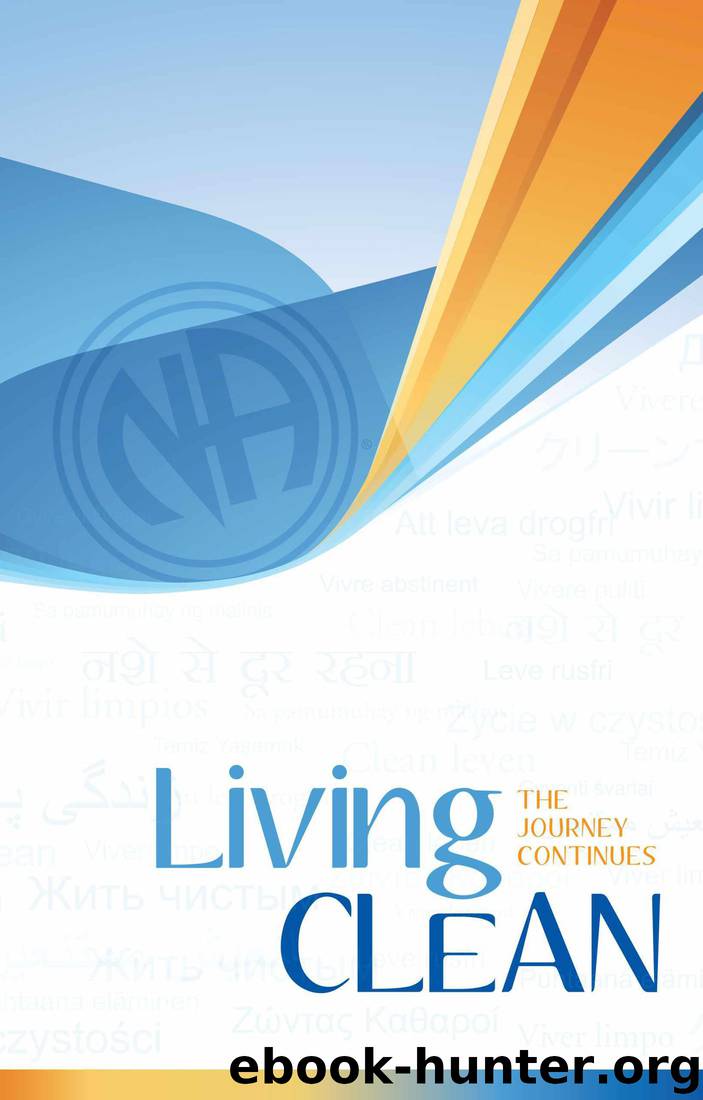Living Clean: The Journey Continues by Narcotics Anonymous

Author:Narcotics Anonymous [Anonymous, Narcotics]
Language: eng
Format: epub
ISBN: 9781557769657
Publisher: Narcotics Anonymous World Services, Inc.
Published: 2013-10-31T23:00:00+00:00
Friendship
We may choose the first people we get close to in recovery just because they are available, or they go to the same meetings we do. When we are in crisis, it doesn’t matter if we trust someone or not; we reach out and are grateful that anyone is there to grab our hand and pull us back from the edge. We need to trust before we begin to discern who is trustworthy. Discernment comes from hard experience: trusting people we shouldn’t, being hurt, and coming back anyway. As our respect for ourselves grows, we choose more carefully whom we confide in. We get to know each other better—but we also get a better idea of ourselves and what we want and deserve in our friendships. We begin to recognize the elements of a healthy relationship. A sense of safety can be the biggest difference in our relationships. We start to feel like we can trust people, and we become more trustworthy ourselves.
Our Third Tradition teaches that we are all accepted in NA. We are not going to be thrown out if we make a mistake. So we get to experience different types of relationships—and different kinds of conflicts—safe in the knowledge that we will still be welcome when it’s over. One of the things we notice in recovery is that we have many different kinds of friendships. We get to experiment with that, too, and find the ways we are most comfortable connecting. Those also change over time. Relationships are fluid, and that is part of what makes them so challenging: They change all the time. A member we have sort of known for years will ask us to coffee and we become fast friends—or we notice that someone we once were close to has grown away from us and we no longer seem to have as much in common. Our expectations about what a friend should be (or what a partner, a sponsor, or a parent should be) can keep us from addressing the reality of our relationships.
We let go of the things that cut us off from other people and from ourselves. The steps and traditions help us learn how to practice principles, and to clear away the mess that makes it so hard to see what is real. “There were parts of me that were frozen because of my childhood damage,” explained one member. “I made a decision that no one would hurt me again and I would rely only on myself. It created a very lonely world: There wasn’t room for anyone else, not even my Higher Power. It took some serious stepwork to recognize how my early relationships set the patterns for later ones.”
The core of our disease is self-obsession. It needs to be dealt with from the very beginning of our recovery and for the rest of our lives. We begin to learn this the first time we walk into a meeting and feel we are in the right place: The identification we
Download
This site does not store any files on its server. We only index and link to content provided by other sites. Please contact the content providers to delete copyright contents if any and email us, we'll remove relevant links or contents immediately.
The Hacking of the American Mind by Robert H. Lustig(4375)
Right Here, Right Now by Georgia Beers(4197)
Fingerprints of the Gods by Graham Hancock(3991)
Goodbye Paradise(3798)
Bad Pharma by Ben Goldacre(3420)
Happiness by Matthieu Ricard(3040)
More Language of Letting Go: 366 New Daily Meditations by Melody Beattie(3017)
The Social Psychology of Inequality by Unknown(3017)
The Plant Paradox by Dr. Steven R. Gundry M.D(2611)
Drugs Unlimited by Mike Power(2590)
Confessions of a Shopaholic by Sophie Kinsella(2342)
Borders by unknow(2301)
Make Love Not Porn by Cindy Gallop(2103)
Dry by Augusten Burroughs(2096)
Stop Being Mean to Yourself: A Story About Finding the True Meaning of Self-Love by Melody Beattie(1987)
Getting Off by Erica Garza(1928)
Belonging by Unknown(1854)
Yoga and the Twelve-Step Path by Kyczy Hawk(1833)
Unmasking Male Depression by Archibald D. Hart(1808)
